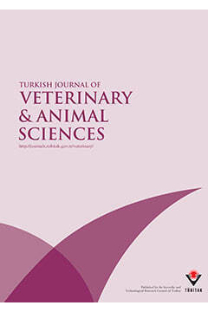Evaluation of Coagulation Profiles in Dogs with Septic Shock
The aim of the this study was to observe possible changes in coagulation profiles in dogs with septic shock. A total of 30 dogs (control group n=10, test group n=20) were used as materials in this study. Although different diseases leading to septic shock were diagnosed in dogs in the test group, dogs were selected on the basis of septic shock criteria such as fever or hypothermia, hypotension, leukopenia or leukocytosis and thrombocytopenia. In addition to the results of rutine clinical and laboratory examination, prothrombin time (PT), activated partial thromboplastin time (aPTT), antithrombin III (AT III), fibrinogen and fibrin split products (FSP), as well as factors (F-VIII and F-IX) playing role in the coagulation mechanism ,were evaluated. In the test group, clinical findings included fever (p
Anahtar Kelimeler:
Septic shock, coagulation profiles, dog
Evaluation of Coagulation Profiles in Dogs with Septic Shock
The aim of the this study was to observe possible changes in coagulation profiles in dogs with septic shock. A total of 30 dogs (control group n=10, test group n=20) were used as materials in this study. Although different diseases leading to septic shock were diagnosed in dogs in the test group, dogs were selected on the basis of septic shock criteria such as fever or hypothermia, hypotension, leukopenia or leukocytosis and thrombocytopenia. In addition to the results of rutine clinical and laboratory examination, prothrombin time (PT), activated partial thromboplastin time (aPTT), antithrombin III (AT III), fibrinogen and fibrin split products (FSP), as well as factors (F-VIII and F-IX) playing role in the coagulation mechanism ,were evaluated. In the test group, clinical findings included fever (p
Keywords:
Septic shock, coagulation profiles, dog,
- ISSN: 1300-0128
- Yayın Aralığı: Yılda 6 Sayı
- Yayıncı: TÜBİTAK
Sayıdaki Diğer Makaleler
Yaşar AKAR, Hamit YILDIZ, Muhterem AYDIN, Hakan KEÇECİ
Salmonella Infection in a Chinchilla Farm
Nurinisa ESENBUĞA, Hayri DAYIOĞLU
Effects of Some Environmental Factors on Growth Traits of Awassi and Redkaraman Lambs
Some Mineral Substance Levels in Serum of Sheep and Goat Grazing in Hatay Region
The Structural and Biochemical Changes of Kidney Tissue on Fluorosis in Rabbits
The Incidence and Pathology of Reproductive Organ Tumors in Chickens
